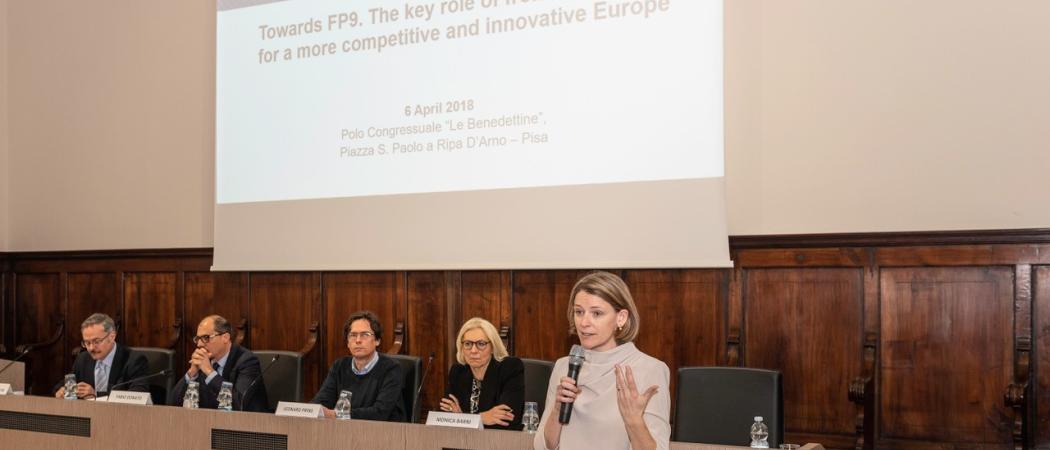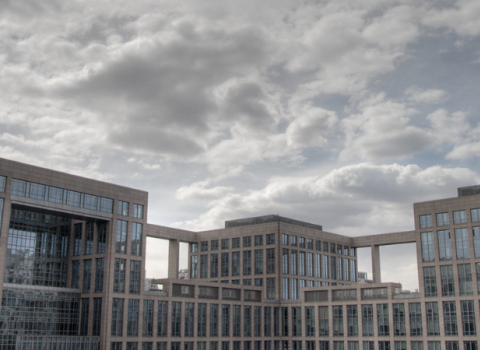
Panel discussion around the latest policy developments toward FP9. Photo: University of Pisa
Key European and national policymakers, researchers, the innovation and the industry community were brought together by the University of Pisa to discuss the key role of frontier research for a more competitive and innovative Europe. Participants discussed the role of frontier research, funding schemes and the relationship with innovative research in the EU’s next programme for research and innovation (FP9).
The event, moderated by Maryline Fiaschi, Managing Director of Science|Business, combined the speakers' distinguished expertise in different research areas and the informed contributions of key actors from EU, national and regional institutions to present the state of play in the debate on FP9.
Professor Paolo Mancarella, Rector of the University of Pisa, opened the conference emphasising the importance of curiosity-driven research and highlighting the role of Tuscany as a unique crossroads in Italy for its expertise in the Research and Innovation sector. The increasing number of EU research grants obtained by the University of Pisa, for instance the prestigious European Research Council (ERC) grants, has recently confirmed this aptitude.
Words of praise to this initiative came from the ERC President Professor Jean-Pierre Bourguignon who sent his greetings through a video message, encouraging national and European investment in excellent research, regarding both funding and researchers' talent.
The lecture of Professor Mark Bishop, Director of the Centre for Intelligent Data Analytics at Goldsmiths, at the University of London, led the conference to the heart of the matter. Through a very interactive presentation, he illustrated his experience of frontier research on Artificial Intelligence and Big Data, also acknowledging socio-ethical risks of using AI in terms of privacy, unintended bias and algorithm opacity.
The Vice Rector for EU and International research of the University of Pisa, Professor Lisandro Benedetti-Cecchi, made a strong point in favour of the support to frontier research, by expressing his belief that innovation passes through fundamental research, as the creation of knowledge is essential to educate, to increase freedom of choice and opportunities.
Renzo Tomellini (Head of Unit on H2020 policy - DG Research and Innovation at the European Commission) and Fabio Donato (R&I Adviser to the Italian Permanent Representation to the EU) provided their informed viewpoint on the latest political and institutional developments around the next Framework Programme for R&I. After the presentation of the project on the general EU budget for 2021-2027 at the beginning of May, the legislative proposal on the new Framework Programme for R&I (FP9) will identify the allocation of this budget on the Research and Innovation section, together with the assessment of the Programme expected impact, presumably by June 8. Both speakers agreed that the Commission proposal is likely to be consistent with the position expressed by the European Parliament on the R&I programme, including the assigned resources, set by the EP to 120 MEUR.
At a regional level, Monica Barni - Regione Toscana Vice President - presented "Toscana Open Research" the open-data observatory on research and its Liaison Office with the EU for research and innovation as two important strategic developments intending to strengthen the R&I Tuscany System.
Leonard Prins, Professor of Organic Chemistry at the University of Padova, presented to the audience the perspective of EU grant recipients. He shared his successful experience as grantee of prestigious EU research grants, including ERC, and stressed the need for society to invest time in fundamental research the same way parents invest it in telling their kids stories with no immediate impact, but with the potential to turn them into responsible adults.
Bernd Stowasser, Head of Public Private Partnerships - Global Alliance Management, Sanofi, meaningfully expressed the point of view of the European industry on the relationship between fundamental and innovative research. Marco Falzetti, Director of the Agency for the promotion of EU research APRE, contributed to the debate with his knowledgeable perspective on the Italian research and innovation scene. At the end of the Conference speakers were asked to propose some recommendations for the future FP9, included in the recordings of the conference together with the whole debate of the day.





 A unique international forum for public research organisations and companies to connect their external engagement with strategic interests around their R&D system.
A unique international forum for public research organisations and companies to connect their external engagement with strategic interests around their R&D system.